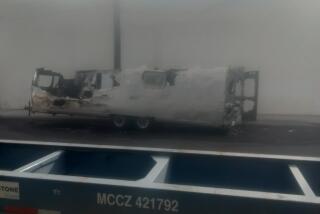PASSINGS: Reginald Levy, Derf Scratch, Robert Tucker
REGINALD LEVY
Pilot was hailed as a
hero in ’72 hijacking
Reginald Levy, 88, a pilot praised for his cool-headed bravery during a 1972 hijacking by Palestinian militants, died of a suspected heart attack or blood clot Aug. 1 in Dover, England, his family said.
Levy was a pilot for Belgian airline Sabena when he took off from Brussels bound for Tel Aviv on May 8, 1972 — his 50th birthday — with 90 passengers onboard.
Mid-journey, the Boeing 707 was hijacked by four armed members of the group Black September, who ordered Levy to land at Israel’s Lod — now Ben Gurion — airport and threatened to blow up the plane if Israel did not release more than 300 Palestinian prisoners.
Levy’s response was admirably calm, even though one of the passengers was his wife, Dora.
He kept talking to the hijackers to keep them calm. Sent to convey messages from the militants to Israeli authorities led by Defense Minister Moshe Dayan, Levy gave the Israelis detailed descriptions of the attackers’ numbers, weapons and positions.
After almost 24 hours, commandos disguised as airplane mechanics stormed the plane, killing two of the hijackers and capturing the other two.
Among the commandos were Ehud Barak, now Israel’s defense minister, and the current prime minister, Benjamin Netanyahu.
Several passengers were injured, but none was killed.
“Every one of us is lucky to be alive,” Levy said after the attack. “I have had some tough times, but this was my toughest.”
Levy’s behavior earned him the admiration of Israeli authorities — and the enmity of Black September, which issued threats against him.
Born in Blackpool, England, in 1922, Levy flew bombers for the Royal Air Force during World War II, earning the Distinguished Flying Cross. After the war, he took part in the Berlin airlift before joining Sabena as a commercial pilot. He retired in 1982.
DERF SCRATCH
Founding bass guitarist
of L.A. punk band Fear
Derf Scratch, 58, founding bass guitarist of the pioneering Los Angeles punk band Fear, died July 28 in Camarillo. He had liver disease.
He was born Frederick Charles Milner III — “Derf” was “Fred” spelled backward — in 1951 in Monmouth, N.J., and grew up in Temple City.
In the late 1970s, Scratch joined Fear as it was forming in the San Fernando Valley, and the guitarist became a key player in Southern California’s early punk scene. In raucous, live performances, the band developed a savage yet sarcastic sound. Fear’s 1978 debut single was “I Love Livin’ in the City,” a snarly swipe at Hollywood.
After comedian John Belushi met Scratch at a Hollywood music store, he hung out with Fear. At Belushi’s insistence, the band was booked on “Saturday Night Live” on Halloween 1981 for what turned into an infamous appearance — slam-dancing punk fans got out of hand, damaging NBC studio equipment and injuring themselves.
That same year, Scratch showed up in the Penelope Spheeris film “The Decline of Western Civilization,” which documented the Los Angeles punk rock scene and Fear’s crowd-baiting antics.
Fear released its first full-length album, “The Record,” in 1982, and Scratch soon left the group. More recently, he had played with the Werewolfs and was seriously injured in 2006 in a car accident after one of the band’s Hollywood shows.
ROBERT TUCKER
Soviet expert and
Stalin biographer
Robert Tucker, 92, a Princeton University professor emeritus who was an authority on Josef Stalin, the Soviet Union and Marxism, died of pneumonia July 29 at his home in Princeton, N.J., the university announced.
Tucker was an attache in the U.S. Embassy in Moscow for nine years during Stalin’s rule. He published two biographies of Stalin and several works on Karl Marx.
Tucker arrived at Princeton in 1962 and the next year became founding director of the university’s Russian studies program. He was a faculty member until 1984.
Born May 29, 1918, in Kansas City, Mo., he earned his bachelor’s and master’s degrees at Harvard University, then worked for the U.S. Office of Strategic Services from 1942 to 1944. Tucker also was a Rand Corp. researcher and taught at Indiana University before joining Princeton.
—Times staff and wire reports
news.obits@latimes.com
More to Read
Start your day right
Sign up for Essential California for the L.A. Times biggest news, features and recommendations in your inbox six days a week.
You may occasionally receive promotional content from the Los Angeles Times.






